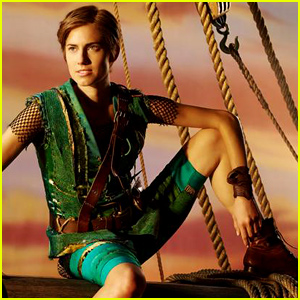The Man Who Is Updating Peter Pan’s Indian Songs
Posted on November 28, 2014 at 2:36 pm

Times have changed, and it is no longer considered appropriate to have the Indians in the story sing nonsense syllables like “ugga wugga.” (This is still better than the really embarrassing song in the Disney version, “What Makes the Red Man Red?” which includes a passage that explains that Indians say “Ugh” because they see their mothers-in-law.) So, with the permission of the rights holders, the producers have brought in Jerod Impichchaachaaha’ Tate, an Emmy Award-winning classical composer and the artistic director of the Chickasaw Chamber Music Festival, to advise them. An interview with Tate in Salon explains
There were three things that I was able to bring to the table to help reconstitute the piece.
The first thing is the opening rhythm. There’s this very clever col legno that’s done with the strings in the very opening that sounds drum-like but also sounds stick-like, which is actually accurate to the Northeastern part of the country with Indians. We adjusted the accents of these constant eighth-note beats so it sounded more like an Iroquois smoke dance, rather than a stereotypical ONE-two-three-four, ONE-two-three-four, ONE-two-three-four, you know, that kind of thing. So we adjusted the opening rhythm so it sounded more authentic. It’s a small cleanup….
Yes, and the trick is — to be honest with you, most Americans aren’t going to know the difference. But at least we do. Intellectually we know, and musically we know, there was a small adjustment. It still sounds a little stereotypical. That can’t go away. Because we were also preserving the integrity of the original compositions and those original compositions were very stereotypical, but they weren’t just stereotypical about Indians. They’re stereotypical about all kinds of things they address within “Peter Pan.” That’s musical theater. That’s something we accept about musical theater. Musical theater thrives on stereotypes. It just does. It always has. So, that being said, there are still ways you can improve it a little bit to where it has a little more integrity. We don’t want to interfere with the original compositions. We want to respect the original composers. But again, just bring a little more authenticity and integrity to the work.
The next example is what I call the “Indian Breakdown.” In the “Ugg-a-Wugg” song — it’s a really campy, British musical theater song, and then it has the “Indian Breakdown,” where you have that tune that goes . It’s this stereotypical, Indian-sounding thing. We were kind of looking for different tunes, but it doesn’t matter what tune you use because the flavor of it is that stereotypical Indian sound. So the musical director was brilliant. He added some different rhythms that were — he flavored it in a way that sounded more entertaining than specific. He kind of veiled it, I guess, a little bit, with some fun rhythms that sound more party-like. I think he had a great solution for that. I thought it was right on the target.
And then the really big thing that we worked on was the replacement of “ugg-a-wugg.” Just a little background: In general, what we all know is that the Indian tribe that’s represented in Peter Pan was influenced by knowledge of Northeast Indians of the United States. So we’re talking Iroquois, Huron, Wyandotte, Algonquin, these kinds of cultural regions. So what I did was I set out to find a replacement word for “ugg-a-wugg” that was literally a Wyandotte word.
The most recent road tour of “Annie Get Your Gun” made some changes to the portrayal of Native American characters, too, though that show will never reflect contemporary sensibilities (or accurately depict the very egalitarian relationship of Annie Oakley and Frank Butler).
I’ll be looking forward to hearing what Tate describes.
